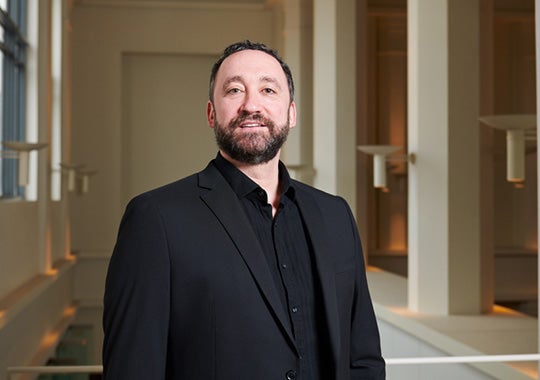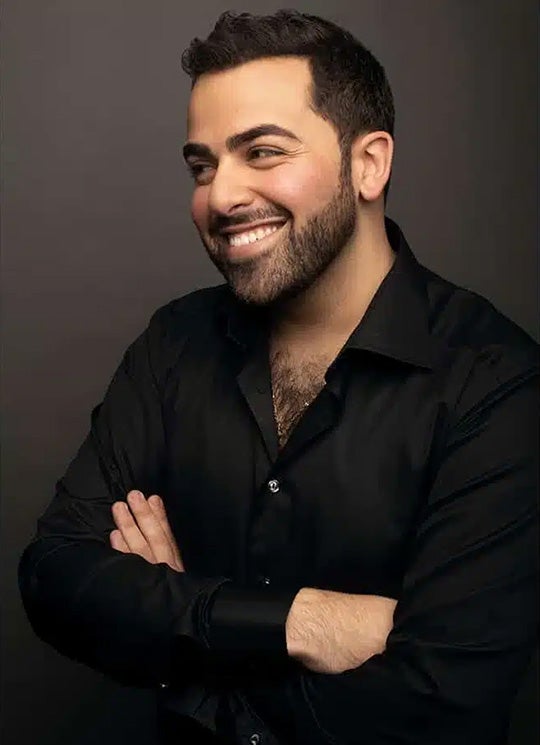
When conductor Louis Lohraseb and director R.B. Schlather first fell in love with Mozart’s “The Magic Flute,” they were children captivated by its wonder and humanity. Decades later, the two artists have the opportunity to bring the opera to life for the first time at Rice University’s Shepherd School of Music.
“The fact that they get to do it for the first time with each other, it’s a dream come true,” said Joshua Winograde, the Shepherd School’s director of opera studies.

The Shepherd School’s production of “The Magic Flute,” sung in German with English surtitles, will unfold as a fantastical journey of love, courage and enlightenment in a pair of sold-out performances Oct. 31 and Nov. 2 at the Brockman Hall for Opera. A daring prince, a beautiful princess, an evil queen and a birdman all collide in a world where trials of wisdom test the limits of faith and devotion. The opera’s blend of sorcery, humor and spiritual reflection makes it both timeless and distinctly human.
“It’s about bravery, it’s about commitment, it’s about fortitude, and it’s about true love,” Winograde said. “It really feels like a fairy tale that can be told at any time in any way to anybody.”
For Schlather, that sense of universality is what keeps “The Magic Flute” timeless. Known for his bold, emotionally focused direction, Schlather said he approaches the opera not as a spectacle but as a deeply human story, one that distills centuries of symbolism into something immediate and clear.
“What we’re trying to do is figure out how to tell the story in the simplest way possible,” Schlather said. “Increasingly, I think the focus of this piece is love — not just romantic love but love as a transformative force in our lives.”
Love, courage and enlightenment are themes that resonate not only in the story but in the process of creating it. Winograde’s repertoire choices are driven by educational purpose rather than convenience or popularity.

“When we are selecting titles for the students, we want to consider the opportunities that are best for their development,” Winograde said. “Of course, we also hope it’s entertaining for the audience. But first and foremost, it’s the experience for the students.”
That student-centered philosophy is part of what makes “The Magic Flute” such a natural fit for the program. With a large cast and wide range of musical styles, the opera allows each performer to inhabit a role that challenges and expands their artistry. Every character — from the comic birdcatcher Papageno to the noble Tamino and radiant Pamina — demands a distinct vocal and emotional palette.
“There are so many musical styles that have to be integrated into making one masterpiece,” Lohraseb said. “‘The Magic Flute’ doesn’t seek to be a unified work; it’s more of a pastiche. What makes it so interesting is how Mozart keeps us captivated and makes us feel like it’s all unified.”
For Lohraseb, conducting Mozart feels like returning home. His connection to the composer began when a middle school teacher challenged his youthful certainty that Beethoven was superior. That discovery set him on a lifelong path of musical devotion. Ever since, Mozart’s work has been both a source of inspiration and a test of musical integrity.
Now he’s leading both the opera singers and the Shepherd School orchestral students in the pit, an arrangement that mirrors the school’s collaborative spirit and gives every musician a role in building the production from the ground up.

“When you are at a place like the Shepherd School where talent, ambition and an openness to create and a willingness to achieve are all in so many of the individuals, it creates an environment which makes for really special music making,” Lohraseb said. “I don’t think in certain regards one could ever have a better set of circumstances to do ‘The Magic Flute.’”
That collaborative energy extends far beyond the podium. Schlather recalls the first day the cast and orchestra gathered for a full read-through — a moment that revealed not only the students’ technical mastery but their emotional sincerity.
“Listening to them go through the whole piece, I was struck by how different each aria is,” Schlather said. “I actually burst into tears when the Queen of the Night started that aria because it’s so powerful to experience someone making that music.”
That aria — famous even among those who have never seen an opera — is emblematic of the work’s balance between accessibility and virtuosity. Mozart created a score that manages to be playful, profound and deeply human all at once. In the hands of these young performers guided by a trio of seasoned artists, it becomes something new yet familiar: a rediscovery of wonder.
“Everything R.B. touches has a level of excitement and newness,” Winograde said. “Through his lens, you always feel like you’re being introduced to the material for the first time.”
For the Shepherd School, “The Magic Flute” represents more than a performance; it’s a case study in how artistry, education and collaboration intersect. The production showcases the next generation of musicians learning to interpret the classics with both respect and imagination, a reminder that Mozart’s music still has the power to shape and challenge artists today.

